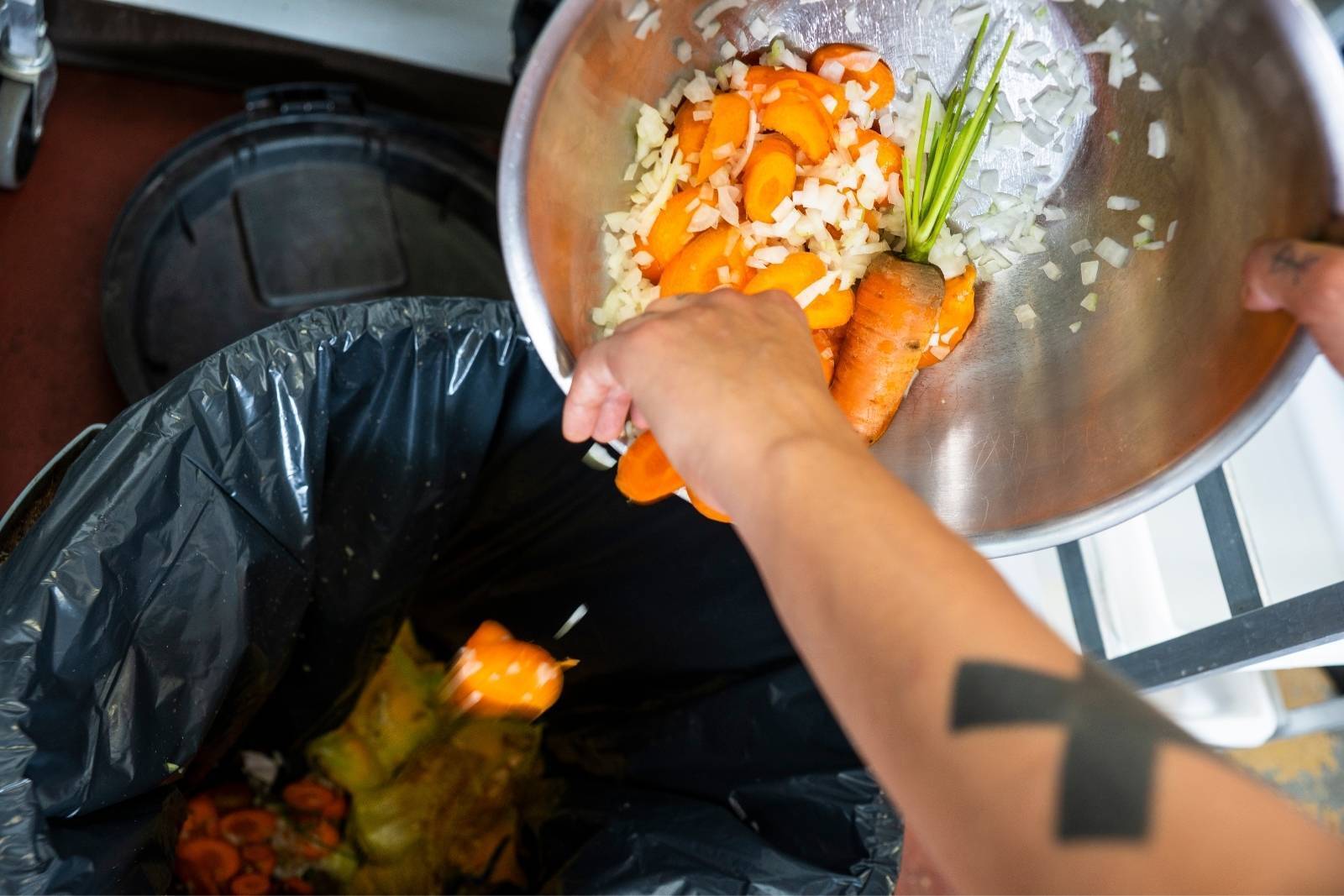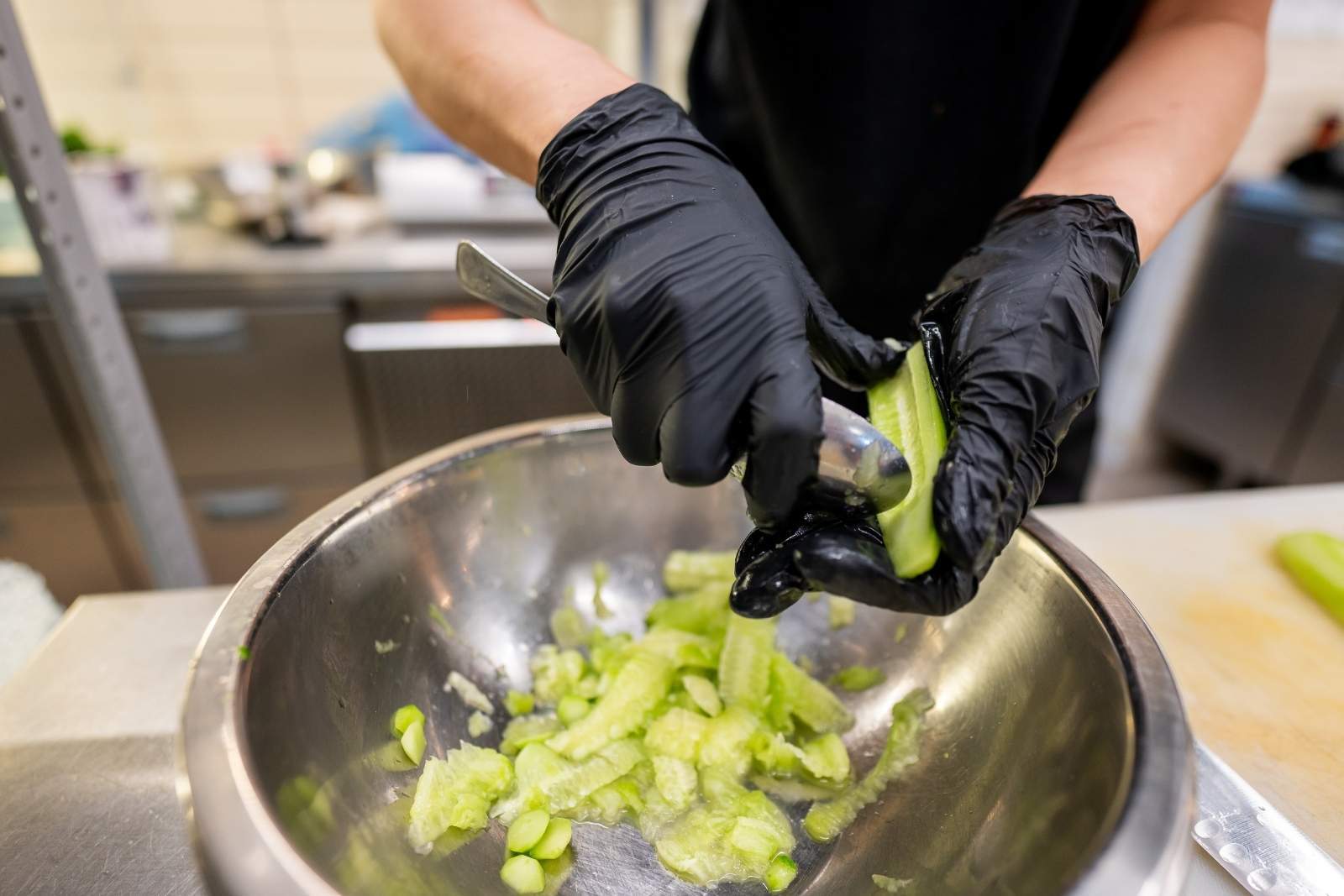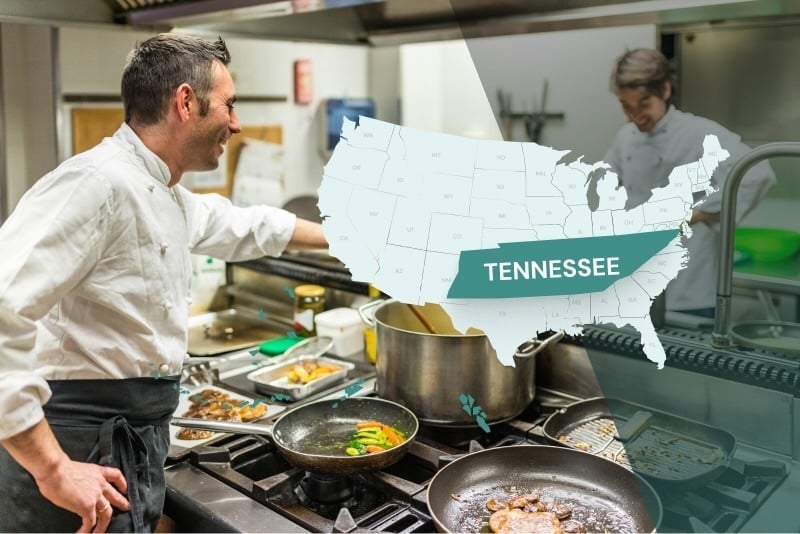Trust20's ANAB-accredited Food Protection Manager Training teaches critical food safety management information and skills. This online food manager training can help you meet state training requirements, prepare for the food manager certification experience, and better understand how to protect your customers.
Our mobile-friendly food protection manager training covers food safety threats, time-temperature abuse, safe facilities, and more in an interactive, entertaining, and relatable format.
Successful completion of this course does not result in a food protection manager certification.
Food Protection Manager Training
English, Spanish
Course Outline
This course is divided into 10 modules and a final assessment. You have two attempts to pass your assessment. The assessment consists of 85 questions, divided equally among the learning objectives. Once you begin your assessment, you have two hours to complete it.
-
1
Food Safety
Explains the consequences of a foodborne illness outbreak, how food becomes unsafe, and the government agencies that help to protect our food supply, consumers, and the foodservice industry as a whole.
-
2
Food Safety Threats: Contamination
Discusses the types of contamination, allergens, deliberate contamination, and how to handle a foodborne illness outbreak.
-
3
Food Safety Threats: Food Handlers
Explains how the personal hygiene, handwashing practices, and health of the food handlers in an establishment can impact the safety of the foods your business serves.
-
4
Food Safety Threats: Time-Temperature Abuse
Provides key information about time and temperature controls, the foods that require time and temperature controls, the temperature danger zone, and how thermometers fit into your food safety strategies.
-
5
Purchasing, Receiving, Storage
Discusses the best practices for purchasing, receiving, labeling, dating, and storing foods to maintain safe, high-quality ingredients in your establishment.
-
6
Preparation
Explains the best practices for safely preparing foods, as well as thawing, cooling, and reheating foods.
-
7
Service
Provides key information about holding foods with and without temperature controls, guidance for managing the kitchen and serving staff, and addressing special circumstances.
-
8
Safe Facilities
Covers considerations for equipment selection and installation, pest management, and how to handle emergency situations.
-
9
Cleaning & Sanitizing
Provides an overview of how to properly clean and sanitize food contact and non-food contact surfaces.
-
10
Food Safety Management
Discusses key information about active managerial control, food safety management systems, and hazard control programs.
Invest in yourself
Trust20's Food Protection Manager Training is CBDM Prior Approved for six sanitation continuing education (CE) hours for ANFP.
Need Certified Food Protection Manager credentials?
Trust20's Food Protection Manager Certification allows you to schedule your testing session today and find out your results immediately after submitting your exam.
Our food safety trainings are ANAB-accredited
Trust20's online, mobile-friendly Food Protection Manager Training is accredited by the ANSI National Accreditation Board (ANAB). This training can help managers and persons in charge meet their training requirements in most states, but please confirm your local requirements with the health department.
Who is the ANSI National Accreditation Board (ANAB)?
The ANSI National Accreditation Board, a wholly owned subsidiary of the American National Standards Institute, is a non-governmental organization that provides accreditation services to public- and private-sector organizations. They are the largest multi-disciplinary accreditation body in the western hemisphere.
Learn more about ANAB and why accreditation mattersThis course has been developed independently of any and all food protection manager certification programs, and taking this training does not guarantee you will pass a Certified Food Protection Manager (CFPM) exam.
Impartiality Statement:
Trust20 understands and values the importance of impartiality in carrying out our certification activities. Trust20 has documented structures, policies, and procedures to manage conflicts of interest and ensures the objectivity of our certification activities. We identify and document any possibilities for conflicts of interest whether they arise from within or from the activities of related bodies. Trust20 will not provide certification to any body related to a conflict of interest.
Have any questions?
Visit Help Center-
Q:
Is Trust20's Food Protection Manager Training the equivalent of a Certified Food Protection Manager Exam?
No, the food protection manager training is designed to provide individuals with a comprehensive food safety education in order to pursue a food service management role.
You must pass a CFPM exam from an accredited certification program recognized by the Conference for Food Protection (CFP) in order to become a Certified Food Protection Manager.
-
Q:
What is Trust20’s refund and cancellation policy?
All sales on Trust20’s products are final, non-transferable, and non-refundable. The Food Protection Manager Training and Certificate is available for a year once purchased and 60 days once you begin. There are no extensions to these terms.
-
Q:
After I finish my food protection manager training, how do I become a Certified Food Protection Manager?
You must pass an accredited Certified Food Protection Manager (CFPM) exam to earn your certification.
You can purchase access to a CFPM exam from Trust20 at: https://trust20.co/food-protection-manager-certification.
-
Q:
What browser should I use for my training?
Our Learning Management System works best on Google Chrome. They do not support Safari, and some functionality may be limited on Microsoft Edge and Mozilla Firefox.
-
Q:
What does ANAB mean?
ANAB stands for the “ANSI National Accreditation Board.” The ANSI National Accreditation Board is a wholly owned subsidiary of the American National Standards Institute (ANSI) that provides accreditation services and training to public- and private-sector organizations, serving the global marketplace. They are the largest accreditation body in North America. We are providing services under an accreditation issued by the ANSI National Accreditation Board (ANAB).
-
Q:
What does the Food Protection Manager Training cover?
The content of this product is divided into the following 10 topics:
-
Importance of Food Safety
-
Food Safety Threats - Contamination
-
Food Safety Threats - Food Handlers
-
Food Safety Threats - Time-Temperature Abuse
-
Purchasing, Receiving, and Storage
-
Preparation
-
Service
-
Safe Facilities
-
Cleaning & Sanitizing
-
Food Safety Management
-
-
Q:
Does my Food Protection Manager Training expire?
Yes. An unused product is valid for one year from the date of purchase. Once you begin, you must complete it within 90 days. You will not be able to access the course once it has expired. This product is nonrefundable, and the expiration dates cannot be extended. Your Certificate of Completion is valid for five years unless superseded by local jurisdiction.
-
Q:
How are the questions formatted on the learning assessment?
All questions are multiple choice.
-
Q:
Will I receive a notice before this product expires?
Yes. You will receive an email 90 days before your access expires.
-
Q:
What languages are available for Trust20’s Food Protection Manager Training?
The course is offered in English and Spanish.
-
Q:
What are the requisites to earn a Certificate of Completion for the Food Protection Manager Training?
In order to ensure that learners receive the same instruction prior to completing the assessment the following requisites were developed:
-
Learners must complete all the course activities to ensure they have received the intended instruction on each learning objective. Each module activity must be completed before they are allowed to move forward, and they cannot access the exam until all activities have been completed. Previously completed content can be reviewed at any time until the assessment begins.
-
Learners must pass the course assessment with a 75% or higher (60 out of 80 questions) before they can receive your Certificate of Completion. They may take the assessment two times to attempt to achieve this score.
-
-
Q:
What does it mean to have a Certificate of Completion from Trust20’s Food Protection Manager Training? How do I properly refer to and use my certificate?
You may refer to the certificate as a “Certificate of Completion” from Trust20’s Food Protection Manager Program. “Recipient of a Certificate of Completion from Trust20.”
Unless you and/or your managers have passed a Certified Food Protection Manager Certification Exam as well, you may not say or imply that you are “certified,” “certificated,” “licensed,” “registered,” or “accredited.” Certificates may not be tampered with, and text or logos may not be added to them, without express written permission from Trust20.
-
Q:
Are there prerequisites to taking the Trust20 Food Protection Manager Training?
No, Trust20’s Food Protection Manager Training is available to any person who wants to deepen their knowledge of food safety.
-
Q:
Who developed Trust20’s training and how do I know it will cover all the relevant information that I need?
Trust20 partnered with instructional designers, food safety subject matter experts, and food industry professionals to create a course that adheres to the ADDIE Instructional Design Methodology. We conduct bi-annual revisions and iterations of the training with input from an Advisory Council of experts from across industries.
-
Q:
What information do you collect and how do you use it?
We collect your name, email address, phone number, address, and payment information. That information is treated as confidential and not disclosed to parties other than the individuals providing it (you) or the certificate issuer (Trust20).
-
Q:
How are complaints related to assessments or certificates resolved?
Before filing a complaint, you should first contact Trust20 Support. During normal business hours, someone will typically respond within a few hours.
If our customer support team cannot help you find a solution, you will find an option to file a complaint in their follow-up email.
Once you file a complaint, our team will respond to your concern within seven business days. We will work promptly (within up to 45 calendar days) to resolve any issues.If you wish to withdraw your complaint, please submit another form with your request.
-
Q:
What is the purpose of the Food Protection Manager Training?
This product aims to provide comprehensive education to any individual with a base knowledge of the food service industry interested in a food service management role. This further education aims to ensure they are safe and knowledgeable enough to prevent harm to customers, co-workers, and themselves.
-
Q:
What are the learning outcomes and goals for Trust20's Food Protection Manager Training?
Upon successful completion of this course, the individuals will be able to:
-
Identify the consequences of foodborne outbreaks, how they occur, and steps to take in the event of occurrence.
-
Recognize food contaminants, including the Big 6, and identify how to handle outbreaks in the event of contamination.
-
Identify common food allergens and the steps to safely store allergens and serve customers with allergies and intolerances.
-
Identify best practices for personal hygiene as it applies to food service workers, steps to take as a manager when one of your employees is ill, and proper handwashing guidelines.
-
Identify the Temperature Danger Zone, why it's important, and best practices regarding time-temperature safety.
-
Identify best practices when purchasing, receiving, and storing food service items.
-
Identify best practices in all steps of the food preparation process and when serving vulnerable groups.
-
Recognize best practices when holding food at temperature for service and serving ready-to-eat foods.
-
Identify the steps to maintaining a safe food service facility as well as best practices for emergency situations.
-
Identify best practices for cleaning an establishment as they apply to food safety.
-
Identify good management practices as they regard setting up an establishment for food safety.
-
-
Q:
What equipment do I need for this product?
This certificate program is provided in an asynchronous eLearning format. This means that learners will need access to a computer, laptop, tablet, phone, or otherwise internet-connected device.
-
Q:
How many attempts do I have to pass my assessment in the Food Protection Manager Training?
You have two attempts to pass your assessment. If you do not pass with a score of 75% or higher (60 out of 80 questions), you will need to contact Trust20 Support to purchase a new course and have it added to your account.
-
Q:
How can my employer verify my certificate status with Trust20?
Employers should submit a support ticket through Trust20's Help Center specifically requesting person verification. This ticket should include your full name and Unique ID (listed on the certificate you received upon passing your assessment.) Verification requests will be processed within 48 hours during our support team’s business hours (9am-7pm EST Monday-Friday). -
Q:
Is Trust20 comparable to ServSafe or 360training/Learn2Serve?
Trust20's products have been accredited by the ANSI National Accreditation Board and therefore adhere to the same standards as ServSafe and Learn2Serve. Our products are accepted by most states that have requirements around training and certification, but you should always check with your employer and/or local health department prior to making a purchase.
Food Manager Training
Purchasing for your team?Ohio Food Safety Certification with Trust20
Trust20 is an approved provider of Food Safety Certification in the state of Ohio. Get your Person-In-Charge or Food Manager Certification today.
Ohio Person-In-Charge Certification
$30.00 Level 1 features:-
Training course
-
Written exercise
Ohio Manager Certification
$140.00 Level 2 features:-
Training course
-
Certification exam
Explore food safety related resources
View all blog posts




